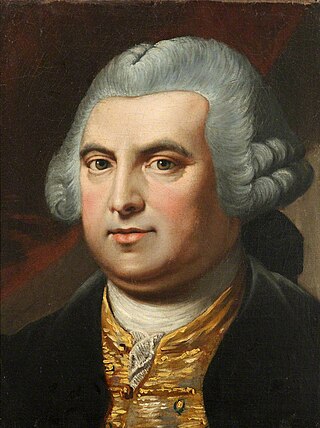
Robert Barclay was a Scottish Quaker, one of the most eminent writers belonging to the Religious Society of Friends and a member of the Clan Barclay. He was a son of Col. David Barclay, Laird of Urie, and his wife, Lady Katherine Barclay. Although he himself never lived there, Barclay was titular governor of the East Jersey colony in North America through most of the 1680s.

The Middle Colonies were a subset of the Thirteen Colonies in British America, located between the New England Colonies and the Southern Colonies. Along with the Chesapeake Colonies, this area now roughly makes up the Mid-Atlantic states.

Andrew Hamilton was a Scottish lawyer in the Thirteen Colonies who settled in Philadelphia. He was best known for his legal victory on behalf of the printer and newspaper publisher John Peter Zenger. His involvement with the 1735 decision in New York helped to establish that truth is a defense to an accusation of libel. His eloquent defense concluded with saying that the press has "a liberty both of exposing and opposing tyrannical power by speaking and writing truth."
A lord proprietor is a person granted a royal charter for the establishment and government of an English colony in the 17th century. The plural of the term is "lords proprietors" or "lords proprietary".

Edward Shippen was the second mayor of Philadelphia, although under William Penn's charter of 1701, he was considered the first.
Thomas Rudyard was a Quaker lawyer in London before moving to America and being appointed deputy governor of East Jersey and the first Attorney General of the English Province of New York, the predecessor position to the Attorney General of New York State and the successor position to an analogous office under the Dutch colonial government of New Netherlands.
Gawen Lawrie was a deputy governor of the American province of East Jersey from 1683 to 1686.
Samuel Jennings or Samuel Jenings was born in England and died in Burlington, New Jersey, in 1708.
Edward Hunloke was deputy governor of West Jersey between 1690 and 1692.
Richard Ingoldesby was a British army officer and lieutenant governor of both New Jersey and New York. He became the acting governor for the two colonies from May 1709 to April 1710.

The Frame of Government of Pennsylvania was a proto-constitution for the Province of Pennsylvania, a proprietary colony granted to William Penn by Charles II of England. The Frame of Government has lasting historical importance as an important step in the development of American and world democracy.
William Markham served as deputy governor of the Province of Pennsylvania. Markham was the acting governor of Pennsylvania from 1681 to 1682 and from 1693 to 1699. He was a member of the Church of England and tended to favor the interests of minority religious groups in the primarily Quaker colony.

James Hamilton, son of the American lawyer Andrew Hamilton, was a lawyer and governmental figure in colonial Philadelphia and Pennsylvania. He served two terms as deputy governor of the Province of Pennsylvania from 1748 to 1754 and from 1759 to 1763. From 1745 to 1747, he was the mayor of Philadelphia

John Grubb (1652–1708) was a two-term member of the Pennsylvania Provincial Assembly and was one of the original settlers in a portion of Brandywine Hundred that became Claymont, Delaware. He founded a large tannery that continued in operation for over 100 years at what became known as Grubb's Landing. He was also one of the 150 signers of the Concessions and Agreements for Province of West Jersey.

Richard Penn Sr. was a proprietary and titular governor of the Province of Pennsylvania and the counties of New Castle, Kent, and Sussex, which then included present-day Delaware. He served as governor from 1746 to 1771. His father was William Penn, founder of the colonial-era Province of Pennsylvania, one of the original Thirteen Colonies in British America

William Penn was an English writer, religious thinker, and influential Quaker who founded the Province of Pennsylvania during the British colonial era. Penn was an advocate of democracy and religious freedom known for his amicable relations and successful treaties with the Lenape Native Americans who had resided in present-day Pennsylvania prior to European settlements in the state.
Captain Andrew Bowne was an American colonial politician and jurist, who served in various capacities in both New York and New Jersey.

The East New Jersey Provincial Council or Governor's Council was the upper house of the East New Jersey Legislature under proprietary rule until the surrender of the right of government to The Crown, and Queen Anne's acceptance.
Governor Hamilton may refer to:









